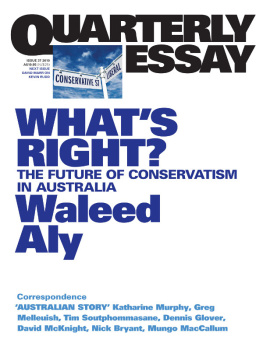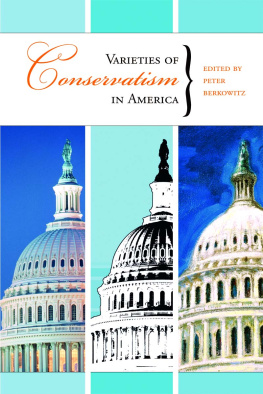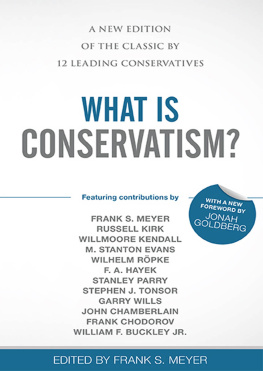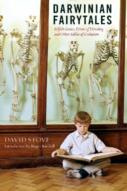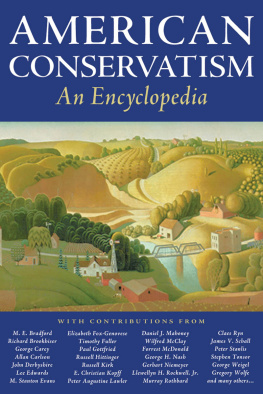Kenneth C. Blanchard Jr. - Darwinian Conservatism: A Disputed Question
Here you can read online Kenneth C. Blanchard Jr. - Darwinian Conservatism: A Disputed Question full text of the book (entire story) in english for free. Download pdf and epub, get meaning, cover and reviews about this ebook. year: 2015, publisher: Andrews UK, genre: Romance novel. Description of the work, (preface) as well as reviews are available. Best literature library LitArk.com created for fans of good reading and offers a wide selection of genres:
Romance novel
Science fiction
Adventure
Detective
Science
History
Home and family
Prose
Art
Politics
Computer
Non-fiction
Religion
Business
Children
Humor
Choose a favorite category and find really read worthwhile books. Enjoy immersion in the world of imagination, feel the emotions of the characters or learn something new for yourself, make an fascinating discovery.

- Book:Darwinian Conservatism: A Disputed Question
- Author:
- Publisher:Andrews UK
- Genre:
- Year:2015
- Rating:3 / 5
- Favourites:Add to favourites
- Your mark:
- 60
- 1
- 2
- 3
- 4
- 5
Darwinian Conservatism: A Disputed Question: summary, description and annotation
We offer to read an annotation, description, summary or preface (depends on what the author of the book "Darwinian Conservatism: A Disputed Question" wrote himself). If you haven't found the necessary information about the book — write in the comments, we will try to find it.
Darwinian Conservatism: A Disputed Question — read online for free the complete book (whole text) full work
Below is the text of the book, divided by pages. System saving the place of the last page read, allows you to conveniently read the book "Darwinian Conservatism: A Disputed Question" online for free, without having to search again every time where you left off. Put a bookmark, and you can go to the page where you finished reading at any time.
Font size:
Interval:
Bookmark:
Title page
Darwinian Conservatism
A Disputed Question
Edited by Kenneth C. Blanchard, Jr.
imprint-academic.com
Publisher information
2015 digital version by Andrews UK Limited
www.andrewsuk.com
Copyright Larry Arnhart 2005 (chapters 110)
Copyright Kenneth C. Blanchard 2009, 2015 (this collection)
The moral rights of the authors have been asserted.
No part of any contribution may be reproduced in any form without permission, except for the quotation of brief passages in criticism and discussion.
Imprint Academic
PO Box 200, Exeter EX5 5YX, UK
Contributors
Larry Arnhart. Professor of Political Science, Northern Illinois University.
Neil Blackstone. Professor, Department of Biological Sciences, Northern Illinois University
Kenneth C. Blanchard, Jr. Professor of Political Science, Northern
State University.
Lauren Hall. Visiting Assistant Professor of Political Science, Rochester Institute of Technology.
Carson Holloway. Associate Professor of Political Science, University of Nebraska Omaha.
Peter Augustine Lawler. Dana Professor of Government and Chair of the Department of Government, Berry College.
Timothy Sandefur. Senior Staff Attorney at the Pacific Legal
Foundation.
Richard Sherlock. Professor of Philosophy at Utah State
University.
Michael Shermer. Publisher of Skeptic .
John G. West. Senior Fellow at The Discovery Institute.
Preface
Larry Arnharts Darwinian Conservatism was published in 2005. I believe that it is an essential contribution to contemporary political thought. The political Left has long been friendly to Darwinism in so far as it constitutes a counterweight to traditional religion, but not at all fond of it when its explanatory strategies are extended to social and political phenomena. Conservatives have, for the most part, been suspicious of Darwinism across the board. Religious conservatives suppose that it tends to undermine belief in Biblical creation. More generally, conservatives tend to view biological explanations of human behavior as reductionist and demoralizing. Darwinian Conservatism made the case that Darwinian moral and political thought was in fact friendly to conservative principles. Whether one agrees with Arnhart or not, his book is an essential resource to both sides of the political spectrum as they orient themselves with respect to modern biology. This is something they will increasingly be forced to do as the life sciences advance in this new century.
To that end, we present here the original text along with a series of commentaries. Many, though not all of the comments come from the right. Following the commentaries are defenses of Darwinian conservatism by Professor Arnhart and myself. The primary issues raised by the original text are dealt with here in a learned and thoughtful way by a range of scholars. Any reader wishing to understand why a conservative might or might not want to accept Darwinism will find this new edition very helpful.
I am very grateful to Professor Arnhart for asking me to edit this volume, to all the contributors, and to Imprint Academic Press.
Kenneth C. Blanchard, Jr.
January 2009
PART ONE: DARWINIAN CONSERVATISM
By Larry Arnhart
Acknowledgements
I am grateful to the Earhart Foundation for research grants that supported the writing of this book. I am also grateful to my political theory graduate students at Northern Illinois University, who helped me to think through many of the ideas in this book, often by forcing me to answer thoughtful criticisms. In particular, I should mention Jennifer Guon, Lauren Hall, Jason Jividen, Steve McCarthy, Andy Schott, Marlene Sokolon, and Chris Whidden. I should also mention Carson Holloway, a former graduate student at Northern who now teaches at the University of Nebraska at Omaha. His new book The New Darwinism (Dallas: Spence Publishing, 2005) develops many of the objections that I have tried to answer in this book.
Larry Arnhart
June 2005
Introduction
Conservatives need Charles Darwin. They need him because a Darwinian science of human nature supports conservatives in their realist view of human imperfectibility and their commitment to ordered liberty as rooted in nature, custom, and prudence. The intellectual vitality of conservatism in the twenty-first century will depend on the success of conservatives in appealing to advances in the biology of human nature as confirming conservative thought.
Oh, yes, I know, these first few sentences will be enough to provoke many conservative readers to toss this book away, because they think the very idea of Darwinian conservatism is silly. A few years ago, when I proposed this idea in First Things , one of the leading journals for religious conservatives in the United States, Michael Behe responded: Im sorry to be blunt, but the notion that Darwinism supports conservatism is absurd.
Behe is a biologist who criticizes Darwinian science for failing to explain the irreducible complexity in the living world that points to an intelligent designer as the cause of life. Behe and others defend intelligent design theory as superior to Darwinism. Many conservatives - particularly in the United States - have adopted this argument as part of a political campaign to challenge the teaching of Darwinian science in public schools. This continues a controversy over the public-school teaching of evolution that began early in the twentieth century when William Jennings Bryan supported legislation in the state of Tennessee prohibiting any teaching of evolution as denying the biblical doctrine that human beings were created by God.
The debate here is not just over the scientific truth or falsity of Darwins theory, but also over its moral and political implications. Many conservatives regard Darwinian evolution as a key idea for a scientific materialism that is morally and politically corrupting because it denies the moral dignity of human beings as created in Gods image. So this debate over the teaching of Darwinism in the public schools has become part of what is called the culture war in the United States. This is said to be a war about moral values in which conservatives defend traditional moral and religious values against the scientific materialism and moral relativism of the liberals. Many people have suggested that President George Bushs re-election in 2004 was due, at least in part, by his winning the support of religious conservatives who thought he was on the right side of this cultural war over values.
But my argument is that conservatives can more easily win this cultural war by using Darwinian biology as an intellectual weapon supporting traditional morality - and conservative principles generally - as grounded in human nature. I am not alone in making this argument. Recently, some conservative thinkers have shown how much of the reasoning about human nature in Darwinian biology supports a conservative view of morality and social order generally. For example, in an article for National Review , John McGinnis declared: Conservatism will certainly be easier than liberalism to integrate with evolutionary biology. The constraints of our biological nature explode the most persistent delusion of the Left: that man is so malleable that he can be reshaped or transformed through political actions. Consequently, a Darwinian politics is a largely conservative politics. And yet such claims have disturbed those conservatives who fear modern science.
Consider, for example, the conservative reaction a few years ago to Francis Fukuyamas book The Great Disruption .
Conservatives like Ferguson and Lawler are at least partially correct, because some Darwinians (Richard Dawkins, for example) do interpret Darwinian theory as dictating a reductionistic view of human beings as governed by their selfish genes. I think Fukuyama ultimately has the better argument, however, because he sees that Darwinian biology rightly understood confirms our common-sense view of human beings as naturally social animals whose social life depends on a natural moral sense, which supports the conservative view of human nature.
Font size:
Interval:
Bookmark:
Similar books «Darwinian Conservatism: A Disputed Question»
Look at similar books to Darwinian Conservatism: A Disputed Question. We have selected literature similar in name and meaning in the hope of providing readers with more options to find new, interesting, not yet read works.
Discussion, reviews of the book Darwinian Conservatism: A Disputed Question and just readers' own opinions. Leave your comments, write what you think about the work, its meaning or the main characters. Specify what exactly you liked and what you didn't like, and why you think so.

